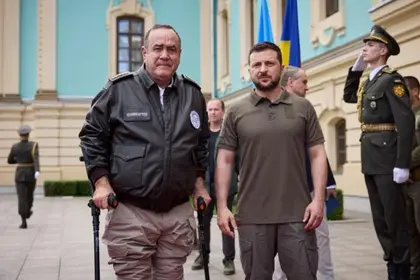Guatemalan President Alejandro Giammattei Falla visited Kyiv on Monday and met with Ukrainian President Volodymyr Zelensky, marking the first visit of a Latin American Chief of State to Ukraine in 12 years.
The conservative Guatemalan leader, who was elected in 2019 before being inaugurated in January 2020, has been outspoken in his support of Ukraine.
JOIN US ON TELEGRAM
Follow our coverage of the war on the @Kyivpost_official.
As an outlier in Latin America, Guatemala has decided to support sanctions against Russia: given the relatively small size of the economies in many Latin American countries, strong support of sanctions was never widely discussed because any loss of economic prowess was considered too unpopular for their leaders to consider implementing.
Giammattei and Zelensky announced a number of joint initiatives to foster closer relations between the two nations, including cancelling visas for each state’s nationals to visit the other’s country and Zelensky said he was certain the steps would “only contribute to the development of business and social ties between our countries and people.”
Furthermore, Zelensky thanked the Guatemalan leader for “supporting the sanctions policy against the Russian Federation.” The Ukrainian President said he was “glad that Guatemala is ready to join the promotion of the initiative to create a special tribunal against Russia for the crime of aggression against the people of Ukraine.”

Zelensky Meets CIA Director William Burns in Ukraine
During their meeting, the leaders agreed to create new initiatives to punish and isolate Russia as recompense for having launched the illegal invasion. Due to the Latin leader’s strong support of Ukraine’s territorial integrity and sovereignty, Zelensky extended an invitation for Giammattei to join the August 27 Crimea Platform Summit.
Aside from support for sanctions against Moscow, and promises of removing visa restrictions, the two leaders agreed that education, especially exchanges among students, as well as research, would be of high importance for the two countries’ future work together.
You can also highlight the text and press Ctrl + Enter






